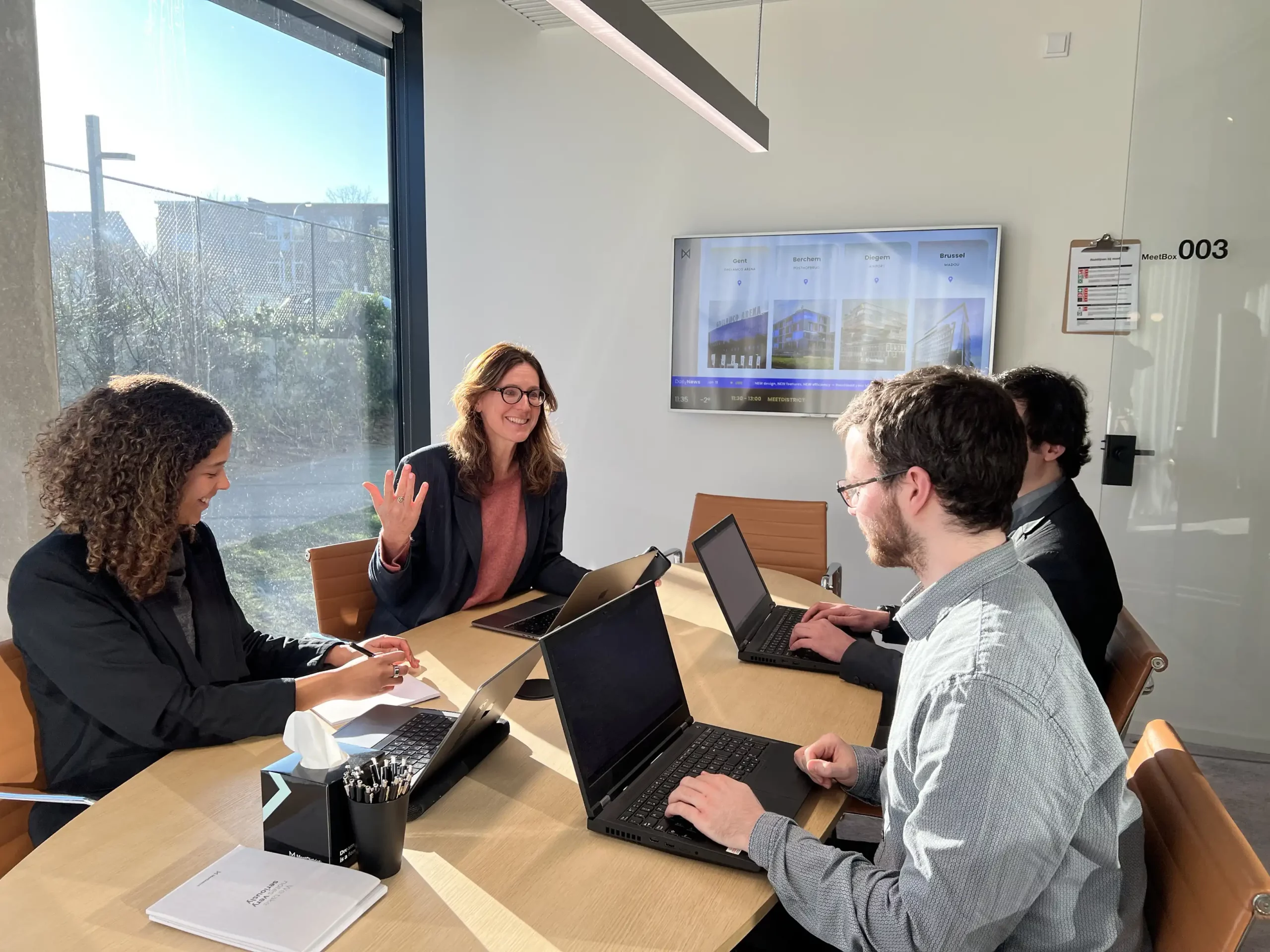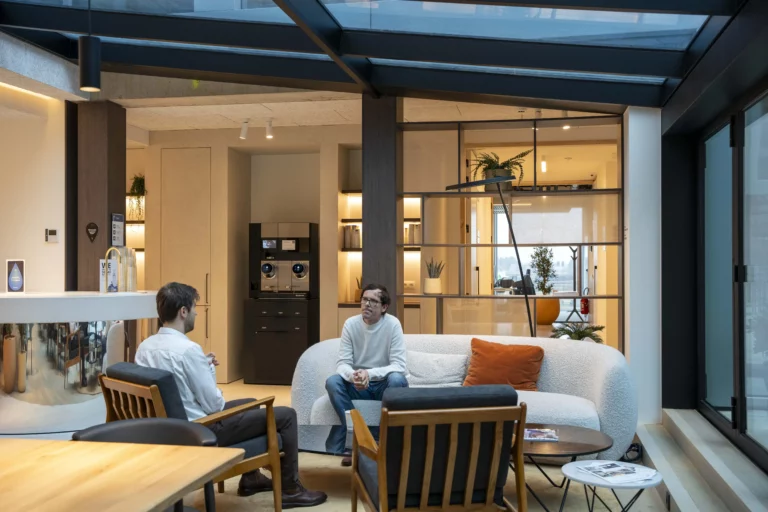In today's economy, everybody wants you. And since many industries have to look far and wide to find the perfect profiles for their open positions, they turn to professional recruiters to support them in that search. We talked to several recruiting experts within the MeetDistrict Community about what the talent acquisition industry looks like today and where it will go in the future. Dive in deeper and learn all about their battle scars.
Who?
It’s no secret that today’s business world is dealing with a tight labour market. There is a mountain of jobs that awaits to be met with the perfect candidate, and it seems like companies are constantly competing for the few unicorns that would suit a certain position. “If I’m not mistaken, demographically you could say that for every 10 people leaving the workforce, only 8 juniors make their entrance”, says Jeroen at Profile Group. “Next to that, the specific skill set of newcomers doesn’t align with the actual needs of the labour market. Resulting in the current well-known and dreaded war for talent”.
Obviously, profile shortage varies between industries. Ilke at SPGL presents us with the surprising fact that pharmaceutical professionals are currently not at all in high demand. “Right now, I’m not actively looking for people to match with a certain project. It’s the other way around: people ask us whether we have a project for them to work on”.
Things could not be more different at X-Care in Motion, where Eva emphasizes how the healthcare industry is longing for a stronger workforce. “Nursing has been a bottleneck profession for a long time already, but over the final years – and especially after COVID – the scarcity of nursing professionals has grown larger and larger”.
And candidates are highly aware of their market value as well. “Some people quite literally go as far to say ‘Show me the money’ when applying for a job”, says Birgit at YouConnect. “Which is no easy tackle, since you need to remain correct and loyal towards your existing team. You cannot hand out more employment benefits to someone new with the same competences simply because you’re short on staff”. Robby at Technicians notices the same evolution in his field. “Employees have the luxury of making higher demands, since they know very well that there are plenty of other outsourcing agencies to turn to when we don’t agree with their terms and conditions.”
Jeroen at Profile Group explains how the war for talent is paired with an immense mentality shift from the employee point of view. “People – and the youngest generation in particular – expect other things from their employers. They don’t believe themselves to be subordinate to their bosses anymore, and regard themselves as internal clients of the company they work for. The company grows stronger thanks to their services, so they need to know what’s in it for them.” Bram at Page Personnel likes to see the silver lining. “This evolution creates so many opportunities on both sides. When the home office and flexible work culture seeped in after COVID, companies took on a more creative and innovative approach to their corporate culture and presentation. Which is positive for everyone involved!” Birgit at YouConnect confirms the importance of this hybrid work culture, but also notices how some regions of the country are hesitant to accept this new reality. “It is a beautiful benefit for employees to work from home, from places like MeetDistrict, or from wherever they want to. As an employer, you cannot ignore that”.
Koen at Mindcapture and StaffYourTribe also prefers to approach this mentality shift as a challenge, rather than to see it as a difficulty. “Study after study proves that employees place an enormous value on their work-life balance, which is the balance someone looks for between all possible personal and professional affairs they consider important. This balance is naturally an extremely individual matter influenced by personality, age, demographical and geographical aspects, unexpected life events, etc. And when you open up to the conversation of what someone’s work-life balance looks like, you allow for a beautiful and genuine connection to grow”. Eva at X-Care in Motion notices how the growing importance of the work-life balance has found its way towards the healthcare industry as well. “Young people in particular have had enough of constantly having to jump through hoops, working uncompensated time after hours, during weekends or on holidays. Those things have always been typical to this sector, but that is just the thing: healthcare management has never evolved, and newcomers to the workforce have plenty of career opportunities to choose from that would not lead to a probable burnout. And you know what, I completely understand why they would do so”.
“The labour market has never been more mobile either, since people don’t worry too much about shifting jobs anymore”, says Jeroen at Profile Group. Robby at Technicians doesn’t need to look far to confirm the difference in generational mentality. “When I was younger, I almost panicked about the idea of switching jobs. My daughter on the other hand recently graduated and doesn’t blink an eye when telling me how she might stay with her current employer for maybe a maximum of one or two years. I’d love to see for that mentality to change again, since experience retention is incredibly valuable.” Ilke at SPGL considers the flexibility and variety of outsourcing agencies as one of their major assets in today’s labour market. “Our consultants love to regularly switch projects, and working for an agency like SPGL offers a beautiful variety in job content and environments without being considered to be a job hopper. It also offers security, since you remain to be paid even when you’re discharged from the project you’ve been working on.”

Bram at Page Personnel stresses the importance of the candidate experience in today’s recruiting climate. “When looking for a fitting candidate, you need to be ultimately reactive. Candidates today need to feel wanted, and having to wait for feedback on their application for two weeks could easily dampen their interest in a position”. Birgit at YouConnect confirms how a negative candidate experience could heavily impact someone’s decision to choose for a job. “Two years ago, a study from the Boston Consulting Group and The Network proved that 52% of candidates would refuse an otherwise attractive job offer if they had a negative experience during the recruiting process. Could you imagine! It’s so important that everyone involved attributes to a flawless experience; from the first impression at the reception, to the small-talk on the way to the meeting room, to the questions asked by the interviewer. People take in everything, and more than often someone’s decision to accept a job depends on the details”.
Eva at X-Care in Motion adds how employer branding has grown extremely important. “Recruiting now has evolved into a sort of marketing industry.

You have to be able to really sell your open positions, since candidates don’t shy away from shopping around either.”“Recruiters definitely have to approach the market like marketeers do”, confirms Jeroen at Profile Group. “Think about what your company has to offer. Your strengths, your weaknesses, how to communicate those and how to make these attainable for a candidate. Analyse your target group, write down your employee value proposition, and don’t forget to nurture either”.
“To nurture your talent is incredibly important”, agrees Koen at MindCapture and StaffYourTribe. “In the way we work with our consultants, the human aspect now has a far larger value than it used to back in the day. You have to proactively sense whether someone is happy with the project they’re assigned to, really look after their needs and understand their desires. Making your internal HR management and procedures some of the most important weapons in the war for talent”. Bram at Page Personnel could not agree more: “Recruitment doesn’t stop when a candidate signs for a job. At Page, we remain involved as a go-to both for our clients and our candidates during the first six months of their placement, since it is extremely important to tackle early issues that appear when the honeymoon phase is over”. “Yesterday I was having lunch on-site with a couple of our consultants”, recalls Ilke at SPGL. “And one of their teammates from a competing outsourcing agency was surprised to see me there, since they had never seen someone from their agency come to visit before. Which I believe is so weird, since you win so much from maintaining a personal connection with your people. Our consultants are being bombarded with job offers on LinkedIn; what is refreshing for them is a friendly face and a genuine, personal approach”. Eva at X-Care in Motion agrees: “At X-Care, we really try to implement the personal approach into the healthcare industry. Next to making sure that our people are being compensated for performed overtime and that they are assured of a healthy dose of off-time, we want to be there for them. It’s scary to hear how many people are surprised about the fact that we make time for an evaluation interview every three months, simply because they never had that when they worked for a traditional healthcare institution.”
When we discuss the different media and platforms which people in the recruiting industry turn to for new talent, anything goes. “Job boards are not dead”, says Jeroen at Profile Group. “Of course, everything depends on your target candidates. Gen Z for instance rather turns to TikTok than to the VDAB platform, but traditional Belgian job boards like StepStone, Jobat and VDAB still attract about 5 million visits per month. You do have to make sure to make proper use out of them, since you won’t stand out with a boring and uninspiring description of twenty daily tasks and ‘a competitive salary’. But if you do follow the right steps, almost half of your candidates originates from a traditional job board”.
Robby at Technicians confirms the relevance of the traditional job boards. “We begin our day by opening VDAB, since that platform remains the go-to for technical profiles. Next to that we also post on Facebook, Indeed, LinkedIn, and we have a referral programme too. We don’t go to fairs, since that’s typically not where our people would go to”. Birgit at YouConnect on the contrary does frequent job fairs. “We believe job fairs are very important to stay connected with the younger generation and to generate brand awareness. Social media and traditional job boards definitely are still very valuable in today’s recruiting landscape, but for our audience they don’t really work. Apart from LinkedIn of course, which has grown indispensable and has succeeded in securing a very powerful position in the world of talent acquisition”.
Ilke at SPGL confirms this loud and clear: “LinkedIn Recruiter is my definite go to, next to falling back on our personal and professional network”.
Overall, the experts agree that nothing tops the power of a large network and a professional database. “When we go to job fairs, our highest goal is to network rather than to inform”, says Eva at X-Care in Motion. “Obviously, we want to tell people about what we do, but most of all we send our best salespeople who know how to make connections and leave a good and attractive impression of us as an employer. Keep in mind that people hold on to their gut feeling, and that word of mouth advertising is of enormous value. For instance, we actively set up an ambassadors programme because we noticed how most of our inflow originates from personal referrals”. Jeroen at Profile Group is very clear: “Without a question, networking remains the most important way to find talent. You have to constantly work on your database, like a good sales representative nurtures their prospects”. Bram at Page Personnel hints at the luxury of working for a large international organisation. “Around the world about 7000 consultants work for Page Personnel. If they reach out to about 3 to 4 profiles per day, you end up with a worldwide network of about 4 million people after only 200 workdays. The most important thing is to keep a close and personal connection to your clients. Relationship management is key! You’ll notice that the longer you work in the field, the stronger your network grows and the more you’ll enjoy the job”.
The world is opening up to AI. According to Koen at MindCapture and StaffYourTribe, the technological evolution will bring about big changes. “The internet for instance has only been around for about thirty years, and now we cannot imagine a world without it. The same will happen with AI, but like the internet it will serve as a tool for the recruiting industry which we’ll have to embrace to grow stronger. It will not replace us, since you need to stick to the basics: making genuine connections”. “The recruiting business is a people business, which is its strongest suit”, assures Eva at X-Care in Motion. “We definitely believe that AI can be a major support in the first phase of finding and triggering talent, but the actual connecting, seeding and maintaining of relationships will require for a person rather than for a robot”. “A lot of experienced recruiters shy away from AI and prefer to stick to the old-school way of recruiting, but I believe there are multiple roads that lead to Rome. And the one doesn’t have to exclude the other”, says Jeroen at Profile Group. Birgit at YouConnect is a great fan of AI. “We’re enormously set on innovation, so we enthusiastically support our team to make the most out of this tool. But it is a tool, let’s be very clear about that. The essence of recruiting remains to pay attention to your candidate, to understand what they look for and to actually want to understand too”.
Bram at Page Personnel admits that the scale of their organisation makes them not as innovative as he’d like them to be, since innovation always comes with a fair amount of risk taking. “We are all about optimisation, and that’s why I believe that AI will help us a great deal with searching for profiles and data mining.
We cannot – and should not – compete with robots who do that. But like we survived the rise of the internet and social media, we will survive this. A computer will never see the nuances of human interaction, will never read between the lines and make a perfect match out of something that’s not written black on white. Or at least not for the first years to come”. Robby at Technicians puts it very simply: “The recruiting business is constantly reinventing itself. So it will inevitably change and evolve, but never disappear. We’ll just have to figure out how to find our place in the world of tomorrow”.
